-
 Bitcoin
Bitcoin $83,645.2925
2.13% -
 Ethereum
Ethereum $1,810.3926
2.44% -
 Tether USDt
Tether USDt $0.9997
-0.01% -
 XRP
XRP $2.1625
6.88% -
 BNB
BNB $597.0728
1.93% -
 Solana
Solana $120.3405
5.84% -
 USDC
USDC $1.0000
-0.01% -
 Dogecoin
Dogecoin $0.1697
5.76% -
 Cardano
Cardano $0.6612
4.89% -
 TRON
TRON $0.2366
-0.18% -
 Chainlink
Chainlink $12.9367
4.36% -
 UNUS SED LEO
UNUS SED LEO $8.9186
-4.81% -
 Toncoin
Toncoin $3.2881
-3.62% -
 Stellar
Stellar $0.2568
1.07% -
 Avalanche
Avalanche $18.2513
3.22% -
 Sui
Sui $2.2464
5.05% -
 Shiba Inu
Shiba Inu $0.0...01235
3.20% -
 Hedera
Hedera $0.1624
3.07% -
 Litecoin
Litecoin $83.6396
2.15% -
 Polkadot
Polkadot $3.9903
0.78% -
 Bitcoin Cash
Bitcoin Cash $303.0186
2.29% -
 MANTRA
MANTRA $6.2191
-0.79% -
 Bitget Token
Bitget Token $4.5070
0.81% -
 Dai
Dai $1.0001
0.01% -
 Ethena USDe
Ethena USDe $0.9991
-0.05% -
 Pi
Pi $0.7573
46.01% -
 Monero
Monero $217.7441
1.11% -
 Hyperliquid
Hyperliquid $11.9838
7.25% -
 Uniswap
Uniswap $5.9118
4.14% -
 OKB
OKB $51.3601
9.71%
How do NFTs connect to the Metaverse?
NFTs enhance the Metaverse by providing unique digital assets that users can own, trade, and use across virtual worlds, boosting engagement and creating vibrant economies.
Apr 04, 2025 at 10:36 am
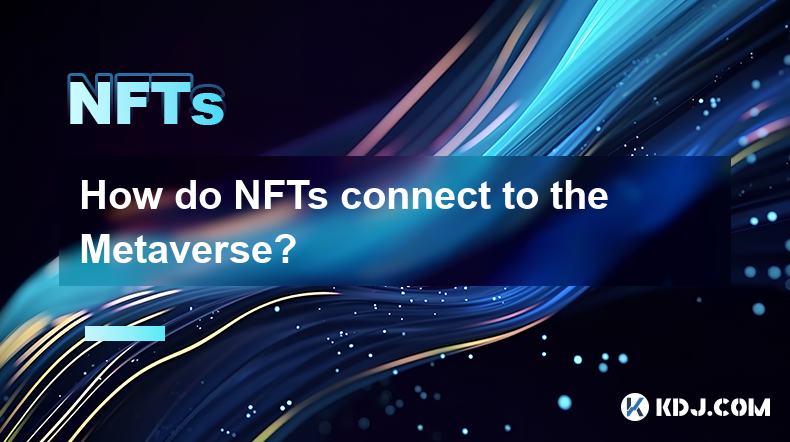
Non-fungible tokens (NFTs) and the Metaverse are two of the most talked-about concepts in the cryptocurrency world today. NFTs, unique digital assets stored on a blockchain, have found a significant role within the Metaverse, a collective virtual shared space created by the convergence of virtually enhanced physical reality and physically persistent virtual space. This article explores the intricate connections between NFTs and the Metaverse, detailing how these digital assets enhance and interact with virtual worlds.
What are NFTs and the Metaverse?
NFTs are unique digital assets that represent ownership or proof of authenticity of a specific item or piece of content, typically stored on a blockchain like Ethereum. They can represent digital art, music, videos, and even virtual real estate. The Metaverse, on the other hand, is a collective virtual shared space, encompassing augmented reality, virtual reality, and the internet. It's a space where users can interact with a computer-generated environment and other users.
How NFTs Enhance the Metaverse Experience
NFTs play a crucial role in enhancing the Metaverse experience by providing users with unique digital assets that can be owned, traded, and utilized within virtual worlds. Here are some ways NFTs enhance the Metaverse:
Ownership and Scarcity: NFTs allow users to own unique digital items, creating a sense of scarcity and value within the Metaverse. This ownership can range from virtual real estate to digital art, enhancing the user's experience by giving them a stake in the virtual world.
Interoperability: NFTs can be used across different Metaverse platforms, allowing users to take their digital assets from one virtual world to another. This interoperability increases the utility and value of NFTs, as users can utilize their assets in various environments.
Economic Systems: NFTs enable the creation of robust economic systems within the Metaverse. Users can buy, sell, and trade NFTs, creating a marketplace that drives engagement and activity within virtual worlds.
Personalization: NFTs allow users to personalize their avatars and virtual spaces with unique digital assets. This personalization enhances the user's experience by allowing them to express their individuality within the Metaverse.
NFTs as Virtual Real Estate
One of the most significant connections between NFTs and the Metaverse is the concept of virtual real estate. Platforms like Decentraland and The Sandbox allow users to purchase, own, and develop virtual land using NFTs. These virtual properties can be used for various purposes, such as hosting events, building virtual businesses, or creating art installations.
Decentraland: In Decentraland, users can buy parcels of land as NFTs, which they can then develop and monetize. These parcels are represented as LAND tokens on the Ethereum blockchain, ensuring their uniqueness and ownership.
The Sandbox: Similarly, The Sandbox allows users to purchase virtual land as NFTs, which they can use to create and monetize their own virtual experiences. These lands are represented as LAND tokens on the Ethereum blockchain, providing a secure and verifiable way to own virtual property.
NFTs and Virtual Economies
NFTs are integral to the virtual economies within the Metaverse. They enable the creation of marketplaces where users can buy, sell, and trade digital assets, driving economic activity and engagement within virtual worlds. Here are some ways NFTs contribute to virtual economies:
Marketplaces: Platforms like OpenSea and Rarible serve as marketplaces for NFTs, allowing users to trade their digital assets. These marketplaces are crucial for the Metaverse, as they facilitate the exchange of value and drive economic activity.
In-Game Assets: Many games within the Metaverse use NFTs to represent in-game assets, such as weapons, skins, and other items. These assets can be traded and sold, creating a vibrant economy within the game.
Creator Economy: NFTs enable creators to monetize their digital content within the Metaverse. Artists, musicians, and other creators can sell their work as NFTs, providing them with a new revenue stream and enhancing the cultural richness of virtual worlds.
NFTs and Social Interaction
NFTs also play a role in enhancing social interaction within the Metaverse. They allow users to showcase their digital assets, creating a sense of identity and community within virtual worlds. Here are some ways NFTs enhance social interaction:
Digital Identity: NFTs allow users to create and showcase their digital identity within the Metaverse. By owning unique digital assets, users can express their individuality and connect with others who share similar interests.
Community Building: NFTs can be used to build communities within the Metaverse. For example, users can join NFT-based clubs or groups, where they can interact with others who own the same digital assets.
Events and Experiences: NFTs can be used to create and participate in virtual events and experiences within the Metaverse. For example, users can purchase NFT tickets to attend virtual concerts or art exhibitions, enhancing their social experience.
NFTs and Governance
NFTs also play a role in the governance of the Metaverse. Some platforms use NFTs to represent voting rights or governance tokens, allowing users to have a say in the development and direction of virtual worlds. Here are some ways NFTs contribute to governance:
Voting Rights: Some Metaverse platforms use NFTs to represent voting rights, allowing users to vote on proposals and decisions that affect the virtual world. This decentralized governance model empowers users and ensures that the Metaverse is developed in a way that reflects the community's interests.
Governance Tokens: NFTs can also be used as governance tokens, giving users the ability to participate in the decision-making process of the Metaverse. These tokens can be traded and sold, creating a market for governance within virtual worlds.
NFTs and Interoperability
Interoperability is a key aspect of the Metaverse, and NFTs play a crucial role in enabling this. By allowing users to take their digital assets from one virtual world to another, NFTs enhance the overall experience and utility of the Metaverse. Here are some ways NFTs contribute to interoperability:
Cross-Platform Use: NFTs can be used across different Metaverse platforms, allowing users to take their digital assets from one virtual world to another. This cross-platform use increases the utility and value of NFTs, as users can utilize their assets in various environments.
Standardization: The use of standardized protocols, such as the ERC-721 and ERC-1155 standards on the Ethereum blockchain, ensures that NFTs can be easily transferred and used across different platforms. This standardization is crucial for the interoperability of the Metaverse.
Portability: NFTs enable the portability of digital assets within the Metaverse. Users can take their NFTs with them as they move between different virtual worlds, enhancing their overall experience and engagement.
NFTs and the Future of the Metaverse
As the Metaverse continues to evolve, NFTs are likely to play an increasingly important role. They provide a way for users to own, trade, and utilize unique digital assets within virtual worlds, enhancing the overall experience and driving engagement. Here are some potential future developments involving NFTs and the Metaverse:
Integration with Physical Assets: In the future, NFTs could be used to represent ownership of physical assets within the Metaverse. For example, users could purchase NFTs that represent real-world items, such as art or collectibles, and use them within virtual worlds.
Enhanced Interoperability: As the Metaverse continues to grow, NFTs could play a key role in enhancing interoperability between different virtual worlds. This could involve the development of new standards and protocols that allow for seamless transfer and use of NFTs across different platforms.
New Economic Models: NFTs could enable the development of new economic models within the Metaverse. For example, users could participate in decentralized finance (DeFi) platforms that use NFTs as collateral, creating new opportunities for earning and investing within virtual worlds.
Common Questions About NFTs and the Metaverse
Q: What are NFTs and how do they work within the Metaverse?
A: NFTs, or non-fungible tokens, are unique digital assets stored on a blockchain, typically Ethereum. Within the Metaverse, NFTs represent ownership of digital items such as virtual real estate, art, and in-game assets. They enhance the Metaverse by providing users with unique, tradable assets that can be used across different virtual worlds, creating a sense of ownership and value.
Q: How do NFTs enhance the user experience in the Metaverse?
A: NFTs enhance the user experience in the Metaverse by providing ownership, interoperability, and personalization. Users can own unique digital assets, take them across different platforms, and use them to personalize their avatars and virtual spaces. This enhances engagement and creates a more immersive and personalized experience within virtual worlds.
Q: Can NFTs be used as virtual real estate in the Metaverse?
A: Yes, NFTs can be used as virtual real estate in the Metaverse. Platforms like Decentraland and The Sandbox allow users to purchase, own, and develop virtual land using NFTs. These virtual properties can be used for various purposes, such as hosting events, building virtual businesses, or creating art installations.
Q: How do NFTs contribute to the virtual economies of the Metaverse?
A: NFTs contribute to the virtual economies of the Metaverse by enabling the creation of marketplaces where users can buy, sell, and trade digital assets. They also represent in-game assets and enable creators to monetize their digital content, driving economic activity and engagement within virtual worlds.
Q: What role do NFTs play in social interaction within the Metaverse?
A: NFTs play a role in social interaction within the Metaverse by allowing users to showcase their digital assets, creating a sense of identity and community. They can be used to build communities, participate in virtual events, and enhance social experiences within virtual worlds.
Q: How do NFTs contribute to the governance of the Metaverse?
A: NFTs contribute to the governance of the Metaverse by representing voting rights and governance tokens. Some platforms use NFTs to allow users to vote on proposals and decisions that affect the virtual world, empowering users and ensuring decentralized governance.
Q: What is the future of NFTs in the Metaverse?
A: The future of NFTs in the Metaverse involves potential integration with physical assets, enhanced interoperability, and new economic models. NFTs could represent ownership of real-world items, enable seamless transfer across different virtual worlds, and facilitate new opportunities for earning and investing within the Metaverse.
Disclaimer:info@kdj.com
The information provided is not trading advice. kdj.com does not assume any responsibility for any investments made based on the information provided in this article. Cryptocurrencies are highly volatile and it is highly recommended that you invest with caution after thorough research!
If you believe that the content used on this website infringes your copyright, please contact us immediately (info@kdj.com) and we will delete it promptly.
- We Become One: The Power Of The Shared Musical Experience
- 2025-04-05 19:20:12
- VanEck Has Filed to Launch the First BNB (Binance Coin) ETF in the US
- 2025-04-05 19:20:12
- The Best Crypto to Buy in April 2024: Qubetics, Theta, Render, and Hedera
- 2025-04-05 19:15:12
- Dogecoin (DOGE) and Pepe (PEPE) Have Long Been Fan Favorites
- 2025-04-05 19:15:12
- Russia Is Moving Closer to Selling Bitcoin Confiscated During Criminal Investigations as Officials Work to Create a Legal Structure for Handling Such Digital Assets
- 2025-04-05 19:10:12
- Solana (SOL) ETF Futures Products Struggle to Attract Investors, Bitcoin (BTC) Dominates the Market
- 2025-04-05 19:10:12
Related knowledge
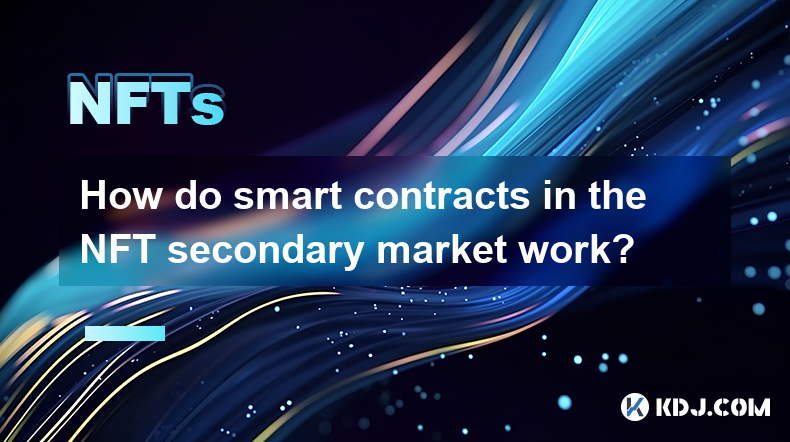
How do smart contracts in the NFT secondary market work?
Apr 03,2025 at 07:14am
Smart contracts play a pivotal role in the NFT secondary market, facilitating seamless transactions and enforcing predefined rules. These self-executing contracts with the terms of the agreement directly written into code are stored on the blockchain. In the context of NFTs, smart contracts automate the buying, selling, and transferring of digital asset...
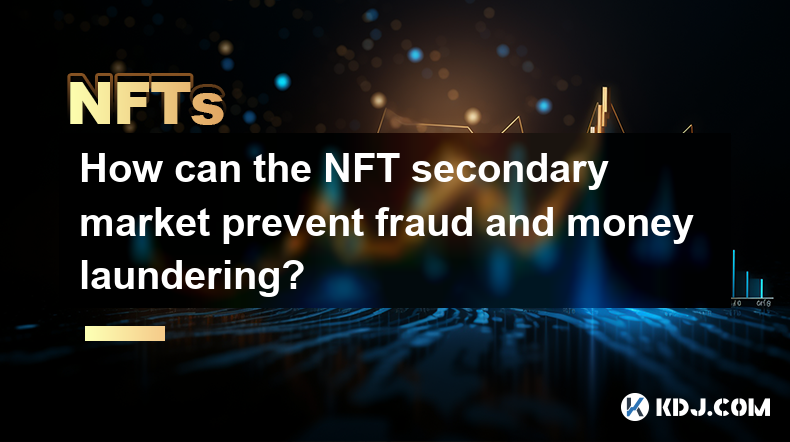
How can the NFT secondary market prevent fraud and money laundering?
Apr 03,2025 at 08:35am
The NFT secondary market has become a thriving hub for digital art and collectibles, but it also faces challenges in preventing fraud and money laundering. To tackle these issues, the market can implement various strategies and technologies to ensure a safer and more transparent trading environment. This article will explore how the NFT secondary market...
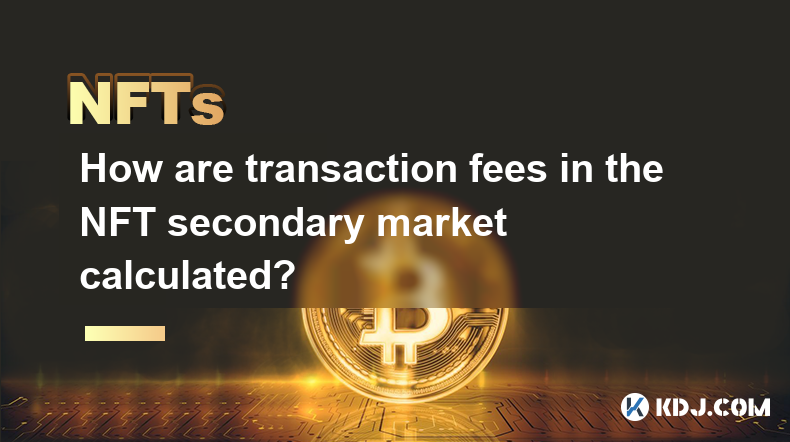
How are transaction fees in the NFT secondary market calculated?
Apr 04,2025 at 05:28am
The calculation of transaction fees in the NFT secondary market is a crucial aspect that both buyers and sellers need to understand. These fees can significantly impact the overall cost of transactions and the profits that sellers can make. In this article, we will delve into the various components that make up these fees, how they are calculated, and w...
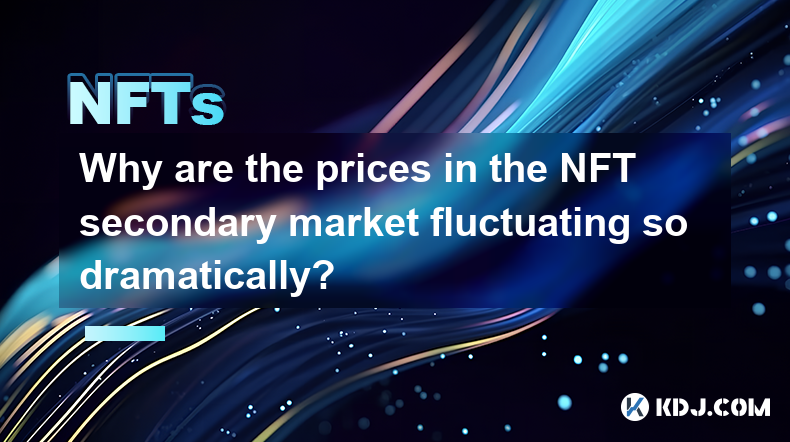
Why are the prices in the NFT secondary market fluctuating so dramatically?
Apr 03,2025 at 10:35pm
The NFT secondary market has been experiencing dramatic price fluctuations, leaving many in the cryptocurrency community puzzled and curious. To understand this phenomenon, it's essential to delve into the factors driving these price movements. From the impact of market sentiment and celebrity endorsements to the role of speculation and the unique natur...
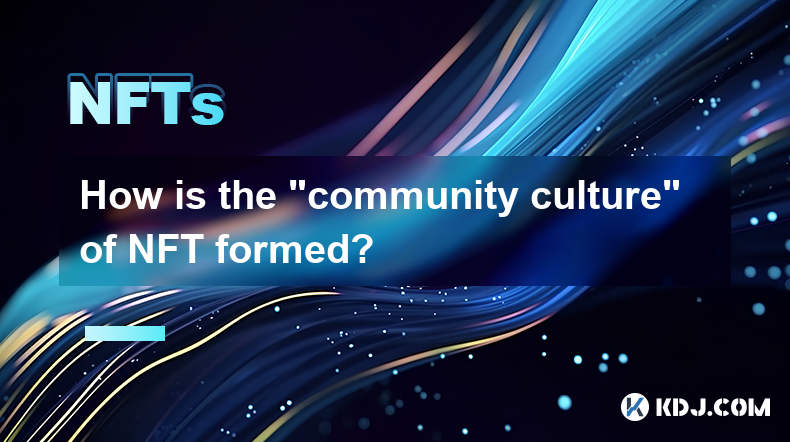
How is the “community culture” of NFT formed?
Apr 03,2025 at 11:07am
The formation of the 'community culture' within the NFT (Non-Fungible Token) space is a fascinating and multi-faceted process. It involves various elements such as shared interests, active engagement, and the creation of a sense of belonging among members. NFT communities often revolve around specific projects or artists, fostering a unique environment ...
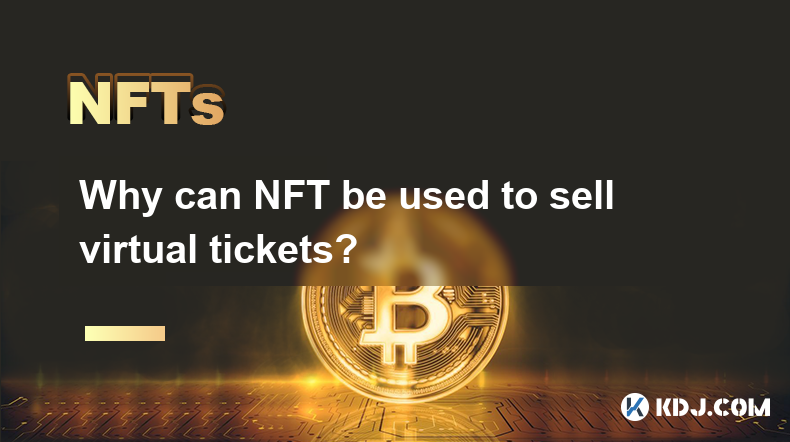
Why can NFT be used to sell virtual tickets?
Apr 03,2025 at 01:35pm
NFTs, or Non-Fungible Tokens, have revolutionized the way we think about digital ownership and value, particularly in the realm of virtual tickets. The primary reason NFTs can be used to sell virtual tickets is their unique nature. Unlike cryptocurrencies such as Bitcoin or Ethereum, which are fungible and can be exchanged on a one-to-one basis, NFTs ar...

How do smart contracts in the NFT secondary market work?
Apr 03,2025 at 07:14am
Smart contracts play a pivotal role in the NFT secondary market, facilitating seamless transactions and enforcing predefined rules. These self-executing contracts with the terms of the agreement directly written into code are stored on the blockchain. In the context of NFTs, smart contracts automate the buying, selling, and transferring of digital asset...

How can the NFT secondary market prevent fraud and money laundering?
Apr 03,2025 at 08:35am
The NFT secondary market has become a thriving hub for digital art and collectibles, but it also faces challenges in preventing fraud and money laundering. To tackle these issues, the market can implement various strategies and technologies to ensure a safer and more transparent trading environment. This article will explore how the NFT secondary market...

How are transaction fees in the NFT secondary market calculated?
Apr 04,2025 at 05:28am
The calculation of transaction fees in the NFT secondary market is a crucial aspect that both buyers and sellers need to understand. These fees can significantly impact the overall cost of transactions and the profits that sellers can make. In this article, we will delve into the various components that make up these fees, how they are calculated, and w...

Why are the prices in the NFT secondary market fluctuating so dramatically?
Apr 03,2025 at 10:35pm
The NFT secondary market has been experiencing dramatic price fluctuations, leaving many in the cryptocurrency community puzzled and curious. To understand this phenomenon, it's essential to delve into the factors driving these price movements. From the impact of market sentiment and celebrity endorsements to the role of speculation and the unique natur...

How is the “community culture” of NFT formed?
Apr 03,2025 at 11:07am
The formation of the 'community culture' within the NFT (Non-Fungible Token) space is a fascinating and multi-faceted process. It involves various elements such as shared interests, active engagement, and the creation of a sense of belonging among members. NFT communities often revolve around specific projects or artists, fostering a unique environment ...

Why can NFT be used to sell virtual tickets?
Apr 03,2025 at 01:35pm
NFTs, or Non-Fungible Tokens, have revolutionized the way we think about digital ownership and value, particularly in the realm of virtual tickets. The primary reason NFTs can be used to sell virtual tickets is their unique nature. Unlike cryptocurrencies such as Bitcoin or Ethereum, which are fungible and can be exchanged on a one-to-one basis, NFTs ar...
See all articles



















































































